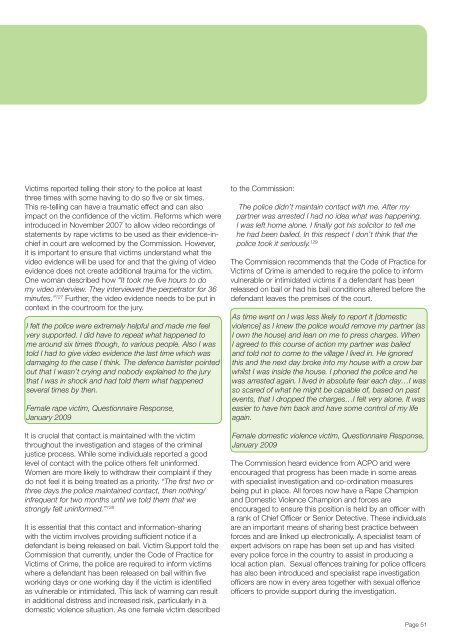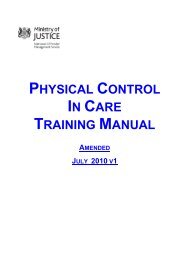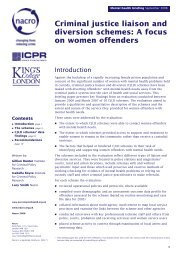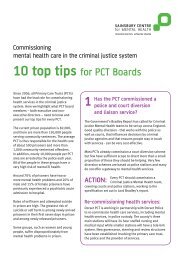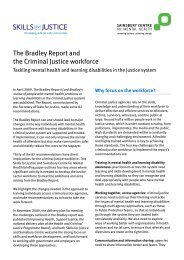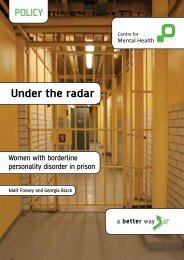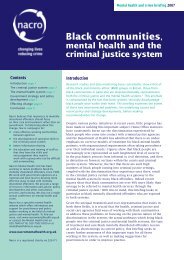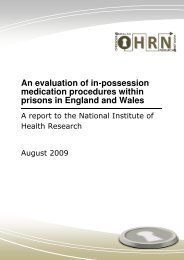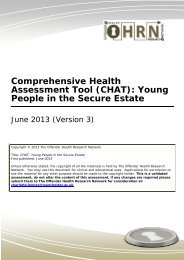Engendering Justice - from Policy to Practice - The Fawcett Society
Engendering Justice - from Policy to Practice - The Fawcett Society
Engendering Justice - from Policy to Practice - The Fawcett Society
- No tags were found...
You also want an ePaper? Increase the reach of your titles
YUMPU automatically turns print PDFs into web optimized ePapers that Google loves.
Victims reported telling their s<strong>to</strong>ry <strong>to</strong> the police at leastthree times with some having <strong>to</strong> do so five or six times.This re-telling can have a traumatic effect and can alsoimpact on the confidence of the victim. Reforms which wereintroduced in November 2007 <strong>to</strong> allow video recordings ofstatements by rape victims <strong>to</strong> be used as their evidence-inchiefin court are welcomed by the Commission. However,it is important <strong>to</strong> ensure that victims understand what thevideo evidence will be used for and that the giving of videoevidence does not create additional trauma for the victim.One woman described how “It <strong>to</strong>ok me five hours <strong>to</strong> domy video interview. <strong>The</strong>y interviewed the perpetra<strong>to</strong>r for 36minutes.” 127 Further, the video evidence needs <strong>to</strong> be put incontext in the courtroom for the jury.I felt the police were extremely helpful and made me feelvery supported. I did have <strong>to</strong> repeat what happened <strong>to</strong>me around six times though, <strong>to</strong> various people. Also I was<strong>to</strong>ld I had <strong>to</strong> give video evidence the last time which wasdamaging <strong>to</strong> the case I think. <strong>The</strong> defence barrister pointedout that I wasn’t crying and nobody explained <strong>to</strong> the jurythat I was in shock and had <strong>to</strong>ld them what happenedseveral times by then.Female rape victim, Questionnaire Response,January 2009It is crucial that contact is maintained with the victimthroughout the investigation and stages of the criminaljustice process. While some individuals reported a goodlevel of contact with the police others felt uninformed.Women are more likely <strong>to</strong> withdraw their complaint if theydo not feel it is being treated as a priority. “<strong>The</strong> first two orthree days the police maintained contact, then nothing/infrequent for two months until we <strong>to</strong>ld them that westrongly felt uninformed.” 128It is essential that this contact and information-sharingwith the victim involves providing sufficient notice if adefendant is being released on bail. Victim Support <strong>to</strong>ld theCommission that currently, under the Code of <strong>Practice</strong> forVictims of Crime, the police are required <strong>to</strong> inform victimswhere a defendant has been released on bail within fiveworking days or one working day if the victim is identifiedas vulnerable or intimidated. This lack of warning can resultin additional distress and increased risk, particularly in adomestic violence situation. As one female victim described<strong>to</strong> the Commission:<strong>The</strong> police didn’t maintain contact with me. After mypartner was arrested I had no idea what was happening.I was left home alone. I finally got his solici<strong>to</strong>r <strong>to</strong> tell mehe had been bailed. In this respect I don’t think that thepolice <strong>to</strong>ok it seriously. 129<strong>The</strong> Commission recommends that the Code of <strong>Practice</strong> forVictims of Crime is amended <strong>to</strong> require the police <strong>to</strong> informvulnerable or intimidated victims if a defendant has beenreleased on bail or had his bail conditions altered before thedefendant leaves the premises of the court.As time went on I was less likely <strong>to</strong> report it [domesticviolence] as I knew the police would remove my partner (asI own the house) and lean on me <strong>to</strong> press charges. WhenI agreed <strong>to</strong> this course of action my partner was bailedand <strong>to</strong>ld not <strong>to</strong> come <strong>to</strong> the village I lived in. He ignoredthis and the next day broke in<strong>to</strong> my house with a crow barwhilst I was inside the house. I phoned the police and hewas arrested again. I lived in absolute fear each day…I wasso scared of what he might be capable of, based on pastevents, that I dropped the charges…I felt very alone. It waseasier <strong>to</strong> have him back and have some control of my lifeagain.Female domestic violence victim, Questionnaire Response,January 2009<strong>The</strong> Commission heard evidence <strong>from</strong> ACPO and wereencouraged that progress has been made in some areaswith specialist investigation and co-ordination measuresbeing put in place. All forces now have a Rape Championand Domestic Violence Champion and forces areencouraged <strong>to</strong> ensure this position is held by an officer witha rank of Chief Officer or Senior Detective. <strong>The</strong>se individualsare an important means of sharing best practice betweenforces and are linked up electronically. A specialist team ofexpert advisors on rape has been set up and has visitedevery police force in the country <strong>to</strong> assist in producing alocal action plan. Sexual offences training for police officershas also been introduced and specialist rape investigationofficers are now in every area <strong>to</strong>gether with sexual offenceofficers <strong>to</strong> provide support during the investigation.Page 51


